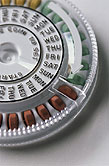
FRIDAY, May 7 (HealthDay News) — Untold millions of women have taken it at some point in their lives, Loretta Lynn wrote a song about it, people have been arrested for it and it’s still one of the most common prescription drugs in the world.
And it’s simply known as “the Pill.”
On May 9, 1960, an advisory committee to the U.S. Food and Drug Administration recommended approval of the birth control pill. The agency did just that 45 days later.
“Since the Pill was approved by the FDA, it has radically changed women’s access to education, to employment and to having the size of family that they want,” said Cecile Richards, president of Planned Parenthood Federation of America, which led the effort to get the Pill approved. “It completely changed women’s ability to control their own destiny.”
Dr. John Preston Parry, assistant professor of obstetrics and gynecology at the University of Wisconsin School of Medicine and Public Health, added: “No medication has come close to the birth control pill in terms of social, political and medical impact. In terms of career opportunities [for women], it’s had more of an impact than anything else. The proportion of women pursuing medical careers has gone from about 10 percent to close to 50 percent.”
But the Pill was never intended to lead women into the workforce or reduce the size of the average family. Nor did the first drug for “prevention” — rather than treatment — immediately alter the landscape.
Planned Parenthood founder and reproductive rights pioneer Margaret Sanger championed the Pill’s beginning, Richards related. But, in 1961, barely a year after the Pill had been approved, the head of Planned Parenthood in Connecticut was arrested for providing it to women. That case went to the U.S. Supreme Court, which, in 1965, ruled that there was a constitutional right for married women to use birth control pills.
It wasn’t until 1972 that single women were granted the right to take the Pill.
Still, the Pill wasn’t — and hasn’t — been embraced by all. Many groups, including religious conservatives, view oral contraceptives as anti-life. There have been numerous reports of pharmacists across the country refusing to fill prescriptions for birth control pills and morning-after pills because the medications violate their moral or religious beliefs.
“Our group was founded with the idea of returning pharmacy to a healing-only profession. What’s been going on is the use of medication to stop human life. That violates the ideal of the Hippocratic oath that medical practitioners should do no harm,” Karen L. Brauer, president of Pharmacists for Life, told the Washington Post in a 2005 interview. Brauer was fired from a Kmart pharmacy in Ohio for refusing to fill birth control prescriptions.
And while reams have been written about the Pill and how it helped to usher in the looser sexual mores of the 1960s, Alex Sanger, grandson of Margaret Sanger and chair of the International Planned Parenthood Council in New York City, doesn’t believe that the Pill spawned the sexual revolution. Or at least not the first one, which he believes occurred in the 1940s and ’50s, courtesy of his grandmother and the emergence of the car as a middle-class commodity.
But, he added, the Pill “contributed, no question about it, to a decline in the birth rate, the end of the baby boom years, women entering the workplace and more women getting control over their fertility.”
Since 1960, the size of the American family has almost halved, women have entered the workforce in record numbers and more are getting advanced degrees. The U.S. Census Bureau reported last month that nearly six out of 10 adults holding advanced degrees between the ages of 25 and 29 are women.
The Pill also reversed gender roles in some fundamental ways, many contend.
“First, it let men off the hook,” Sanger said. “The condom went from the number-one method of birth control in 1960 to an also-ran five years later. There’s one school of thought that says men used this as an excuse to avoid responsibility if there was an unintended pregnancy. . . Therefore, there was a rise in births to single mothers and the decline of marriage.”
The early side effects of the Pill, which included stroke, blood pressure problems, weight gain and acne, may have inadvertently unleashed feminism, Sanger added.
“The side effects of the first-generation Pill — that did more for creating modern feminism than the Pill itself,” he said. “Women who were experiencing these serious side effects went public and dared to speak out. Women in the ’60s were nascent feminists saying, ‘Enough. We’re not going to be treated as guinea pigs and have doctors and scientists telling us this is all in our imaginations.’ This was really a consciousness-raising moment. Women spoke out, admitted they were on the Pill and admitted they were having sex. For women to do, that was quite stunning.”
As new generations of the Pill have been unveiled, the early panic over its health risks have subsided to a large degree. The Pill is now known to have some health benefits, including reducing the risk of uterine and ovarian cancer. And a large study released in March found that women who took oral contraceptives at some point in their lives have a lower risk of death than women who never tried the Pill.
Still, the modern Pill can come with unwanted side effects, such as nausea, weight gain or weight loss, and painful or missed periods. Less common symptoms can include severe headache, severe chest pain, coughing up blood, partial or complete loss of vision, and depression, according to the U.S. National Institutes of Health (NIH).
Oral contraceptives can also raise the risk of stroke for some women, especially those older than 35 who smoke, as well as women with high blood pressure, diabetes or high cholesterol, the NIH reports.
Some doctors regard the Pill as more natural than menstruation.
“Physicians have come to understand that, in many respects, suppressing the ovarian cycle with birth control pills is more natural than having 500 ovulations in a lifetime,” said Dr. Steven Goldstein, a professor of obstetrics and gynecology at NYU Langone Medical Center in New York City.
That’s because nature intended women to have fewer cycles by virtue of being pregnant much of the time, he said.
“People worry it’s not natural,” Goldstein said. “You stop being natural when you don’t have eight kids and nurse them all for 12 to 15 months. There’s no bottle or formula in nature.”
Advocates of the Pill point to unfinished business.
It’s only been within the past decade that insurance companies have begun to cover the cost of the Pill. Even then, many women can’t afford it, contributing to the fact that the United States has the highest rate of unintended and teen pregnancies among Western industrialized nations, Richards said.
“It [the Pill] has made an enormous difference, but there’s still a lot to do,” she said.
More information
For more on birth control methods, visit the U.S. National Women’s Health Information Center.

